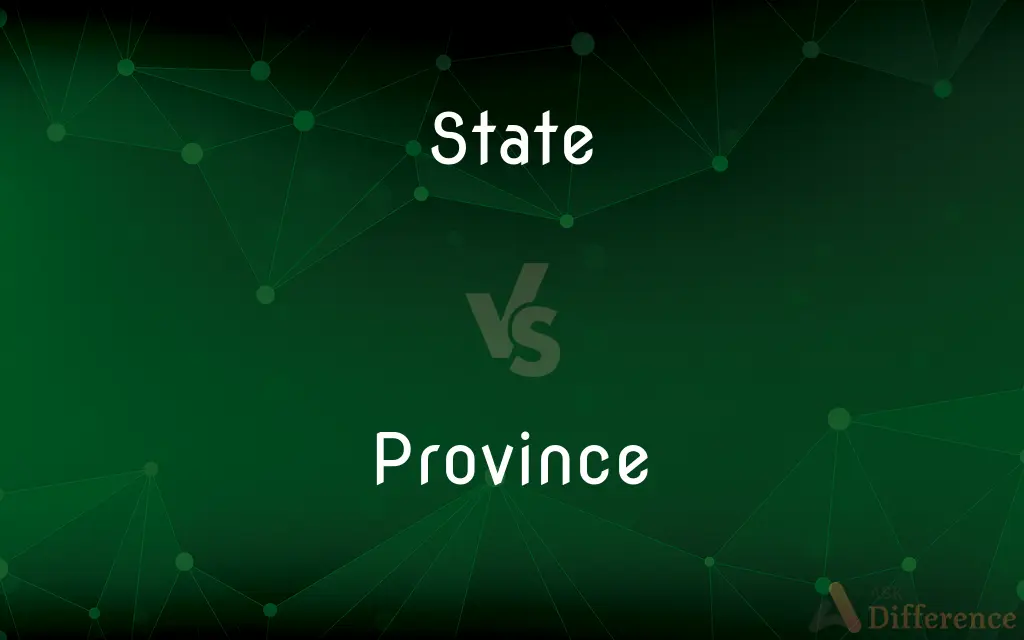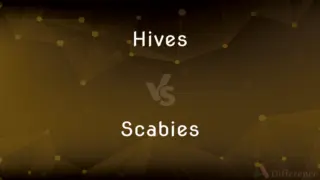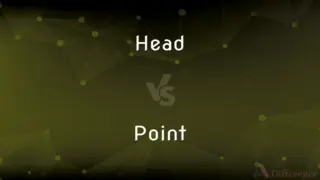State vs. Province — What's the Difference?
By Tayyaba Rehman — Updated on October 3, 2023
State is governmental entity with its own policy-making authority. Province is a territorial unit, sometimes with less governmental autonomy than a state.

Difference Between State and Province
Table of Contents
ADVERTISEMENT
Key Differences
A State and a Province are both geographical and administrative divisions within a country but hold varying degrees of governmental authority. States often possess a higher degree of autonomy, while Provinces might have lesser self-governance, depending on the country's constitutional framework.
States frequently have the authority to formulate and enforce their own laws, independent of the national government. Conversely, Provinces might be subject to more stringent oversight from the national government, adhering more closely to national legislation and policies.
Governance within a State typically involves its own constitution, thereby establishing its own legislative, executive, and judiciary branches. A Province might lack its own constitution and may be subject to the legal and policy frameworks established by the national government.
The term State and Province may also signify different administrative setups depending on the country in context. In the United States, areas are divided into States, while in Canada, regions are categorized as Provinces, each with distinct sets of governing rules.
Culturally, States and Provinces may present subtle differences in their management of resources, administration, and legislative approaches. These distinctions often stem from historical, political, and cultural developments unique to each country's evolution and governance style.
ADVERTISEMENT
Comparison Chart
Autonomy
Often has significant governmental autonomy
Might have limited autonomy depending on the country
Governance
May have its own constitution
May not have its own constitution
Legislative Authority
Can often create and implement its own laws
Might adhere more to national laws
Examples of Usage
Commonly used in the United States
Used in Canada and various other countries
Historical Context
May have a distinct history of establishment
Might be historically linked to colonial rule
Compare with Definitions
State
States often possess significant political autonomy.
The State has its own constitution and set of laws.
Province
Provinces might be subordinated to national governance.
The Province follows healthcare guidelines set nationally.
State
A State may have its own distinct culture and identity.
The State celebrates unique traditions and holidays.
Province
A Province is an administrative division within a country.
British Columbia is a Province in Canada.
State
A condition or mode of being, as with regard to circumstances
The office was in a state of confusion.
Province
A Province may possess cultural and regional distinctiveness.
The Province is known for its unique culinary delights.
State
A condition of being in a stage or form, as of structure, growth, or development
The fetal state.
Province
Provinces may manage certain localized affairs and services.
The Province invested in local public transport services.
State
A mental or emotional condition
In a manic state.
Province
A Province may have a governor or a similar authoritative figure.
The governor of the Province proposed a new tourism initiative.
State
(Informal) A condition of excitement or distress
Was in a state over going to the prom.
Province
A province is almost always an administrative division within a country or state. The term derives from the ancient Roman provincia, which was the major territorial and administrative unit of the Roman Empire's territorial possessions outside Italy.
State
Social position or rank.
Province
A principal administrative division of a country or empire
Chengdu, capital of Sichuan province
State
(Physics) The condition of a physical system with regard to phase, form, composition, or structure
Ice is the solid state of water.
Province
The whole of a country outside the capital, especially when regarded as lacking in sophistication or culture
I made my way home to the dreary provinces by train
State
Ceremony; pomp
Foreign leaders dining in state at the White House.
Province
An area of special knowledge, interest, or responsibility
She knew little about wine—that had been her father's province
State
The supreme public power within a sovereign political entity
The state intervening in the economy.
Province
A territory governed as an administrative or political unit of a country or empire.
State
The sphere of supreme civil power within a given polity
Matters of state.
Province
(Ecclesiastical) A division of territory under the jurisdiction of a metropolitan.
State
A specific kind of government
The socialist state.
Province
Provinces Areas of a country situated away from the capital or population center.
State
A body politic, especially one constituting a nation
The states of Eastern Europe.
Province
An area of knowledge, activity, or interest
A topic falling within the province of ancient history.
State
One of the more or less internally autonomous territorial and political units composing a federation under a sovereign government
The 48 contiguous states of the Union.
Province
The range of one's proper duties and functions; scope.
State
Of or relating to a body politic or to an internally autonomous territorial or political unit constituting a federation under one government
A monarch dealing with state matters.
The department that handles state security.
Province
(Ecology) An area of land, less extensive than a region, having a characteristic plant and animal population.
State
Owned and operated by a state
State universities.
Province
Any of various lands outside Italy conquered by the Romans and administered by them as self-contained units.
State
To set forth in words; declare.
Province
A region of the earth or of a continent; a district or country.
State
A condition; a set of circumstances applying at any given time.
A state of being
A state of emergency
Province
An administrative subdivision of certain countries, including Canada and China.
State
(physics) A complete description of a system, consisting of parameters that determine all properties of the system.
Province
(Roman history) An area outside Italy which is administered by a Roman governor.
State
A mess; disorder.
Absolute state
In a state
Province
(Christianity) An area under the jurisdiction of an archbishop, typically comprising a number of adjacent dioceses.
State
(computing) The stable condition of a processor during a particular clock cycle.
In the fetch state, the address of the next instruction is placed on the address bus.
Province
(Roman Catholicism) An area under the jurisdiction of a provincial within a monastic order.
State
(computing) The set of all parameters relevant to a computation.
The state here includes a set containing all names seen so far.
Province
The parts of a country outside its capital city.
State
(computing) The values of all parameters at some point in a computation.
A debugger can show the state of a program at any breakpoint.
Province
An area of activity, responsibility or knowledge; the proper concern of a particular person or concept.
State
(sciences) The physical property of matter as solid, liquid, gas or plasma.
Province
A country or region, more or less remote from the city of Rome, brought under the Roman government; a conquered country beyond the limits of Italy.
State
(obsolete) Highest and stationary condition, as that of maturity between growth and decline, or as that of crisis between the increase and the abating of a disease; height; acme.
Province
A country or region dependent on a distant authority; a portion of an empire or state, esp. one remote from the capital.
State
High social standing or circumstance.
Province
A region of country; a tract; a district.
Over many a tractof heaven they marched, and many a province wide.
Other provinces of the intellectual world.
State
Pomp, ceremony, or dignity.
In state
The President's body will lie in state at the Capitol.
Province
A region under the supervision or direction of any special person; the district or division of a country, especially an ecclesiastical division, over which one has jurisdiction; as, the province of Canterbury, or that in which the archbishop of Canterbury exercises ecclesiastical authority.
State
Rank; condition; quality.
Province
The proper or appropriate business or duty of a person or body; office; charge; jurisdiction; sphere.
The woman'sprovince is to be careful in her economy, and chaste in her affection.
State
Condition of prosperity or grandeur; wealthy or prosperous circumstances; social importance.
Province
Specif.: Any political division of the Dominion of Canada, having a governor, a local legislature, and representation in the Dominion parliament. Hence, colloquially, The Provinces, the Dominion of Canada.
State
A chair with a canopy above it, often standing on a dais; a seat of dignity; also, the canopy itself.
Province
The territory occupied by one of the constituent administrative districts of a nation;
His state is in the deep south
State
(obsolete) A great person, a dignitary; a lord or prince.
Province
The proper sphere or extent of your activities;
It was his province to take care of himself
State
(obsolete) Estate, possession.
State
A polity.
State
Any sovereign polity; a national or city-state government.
State
A political division of a federation retaining a notable degree of autonomy, as in the United States, Mexico, Nigeria, or India.
State
(obsolete) A form of government other than a monarchy.
State
(anthropology) A society larger than a tribe. A society large enough to form a state in the sense of a government.
State
An element of the range of the random variables that define a random process.
State
The lexical aspect (aktionsart) of verbs or predicates that do not change over time.
State
(transitive) To declare to be a fact.
He stated that he was willing to help.
State
(transitive) To make known.
State your intentions.
State
(obsolete) Stately.
State
The circumstances or condition of a being or thing at any given time.
State is a term nearly synonymous with "mode," but of a meaning more extensive, and is not exclusively limited to the mutable and contingent.
Declare the past and present state of things.
Keep the state of the question in your eye.
State
Rank; condition; quality; as, the state of honor.
Thy honor, state, and seat is due to me.
State
Condition of prosperity or grandeur; wealthy or prosperous circumstances; social importance.
She instructed him how he should keep state, and yet with a modest sense of his misfortunes.
Can this imperious lord forget to reign,Quit all his state, descend, and serve again?
State
Appearance of grandeur or dignity; pomp.
Where least of state there most of love is shown.
State
A chair with a canopy above it, often standing on a dais; a seat of dignity; also, the canopy itself.
His high throne, . . . under stateOf richest texture spread.
When he went to court, he used to kick away the state, and sit down by his prince cheek by jowl.
State
Estate; possession.
Your state, my lord, again is yours.
State
A person of high rank.
State
The principal persons in a government.
The bold designPleased highly those infernal states.
State
The bodies that constitute the legislature of a country; as, the States-general of Holland.
State
A form of government which is not monarchial, as a republic.
Well monarchies may own religion's name,But states are atheists in their very fame.
State
A political body, or body politic; the whole body of people who are united under one government, whatever may be the form of the government; a nation.
Municipal law is a rule of conduct prescribed by the supreme power in a state.
The Puritans in the reign of Mary, driven from their homes, sought an asylum in Geneva, where they found a state without a king, and a church without a bishop.
State
In the United States, one of the commonwealths, or bodies politic, the people of which make up the body of the nation, and which, under the national constitution, stand in certain specified relations with the national government, and are invested, as commonwealths, with full power in their several spheres over all matters not expressly inhibited.
State
Highest and stationary condition, as that of maturity between growth and decline, or as that of crisis between the increase and the abating of a disease; height; acme.
I do not, brother,Infer as if I thought my sister's stateSecure without all doubt or controversy.
We hoped to enjoy with ease what, in our situation, might be called the luxuries of life.
And, O, what man's condition can be worseThan his whom plenty starves and blessings curse?
State
A statement; also, a document containing a statement.
State
Stately.
State
Belonging to the state, or body politic; public.
State
To set; to settle; to establish.
I myself, though meanest stated,And in court now almost hated.
Who calls the council, states the certain day.
State
To express the particulars of; to set down in detail or in gross; to represent fully in words; to narrate; to recite; as, to state the facts of a case, one's opinion, etc.
State
The group of people comprising the government of a sovereign state;
The state has lowered its income tax
State
The territory occupied by one of the constituent administrative districts of a nation;
His state is in the deep south
State
A politically organized body of people under a single government;
The state has elected a new president
African nations
Students who had come to the nation's capitol
The country's largest manufacturer
An industrialized land
State
The way something is with respect to its main attributes;
The current state of knowledge
His state of health
In a weak financial state
State
The federal department in the UnitedStates that sets and maintains foreign policies;
The Department of State was created in 1789
State
The territory occupied by a nation;
He returned to the land of his birth
He visited several European countries
State
A state of depression or agitation;
He was in such a state you just couldn't reason with him
State
(chemistry) the three traditional states of matter are solids (fixed shape and volume) and liquids (fixed volume and shaped by the container) and gases (filling the container);
The solid state of water is called ice
State
Express in words;
He said that he wanted to marry her
Tell me what is bothering you
State your opinion
State your name
State
Put before;
I submit to you that the accused is guilty
State
Indicate through a symbol, formula, etc.;
Can you express this distance in kilometers?
State
A State is a defined territorial and governmental entity.
Florida is a State known for its beaches and warm climate.
State
States typically manage a wide range of governmental responsibilities.
The State oversees public education and infrastructure.
State
A State may formulate its own economic policies.
The State introduced new policies to boost local businesses.
Common Curiosities
What defines a Province?
A Province is a territorial division that may be governed by national laws.
Which countries use the term “State” for subdivisions?
Countries like the United States, Mexico, and India use "State".
What is a State?
A State is a territorial and governmental entity with potential autonomy.
Do all States have their own constitution?
Not always, as the autonomy of a State can vary between countries.
Do Provinces have their own flags?
Yes, Provinces can have their own flags, symbols, and emblems.
Can a State have its own official language?
Yes, depending on the country, States can have their own official languages.
Do Provinces have their own constitutions?
Provinces may not have their own constitutions and can follow national policies.
Can States make their own laws?
Typically, yes. States often have the authority to make their own laws.
Are Provinces responsible for their military?
Typically, no. Military affairs are usually handled by national governments.
How are leaders chosen for States?
It varies, but leaders, like governors, may be elected or appointed.
Which countries utilize the term “Province”?
Canada, China, and Italy, among others, use "Province" as a division.
Are States and Provinces found in all countries?
No, different countries use varied administrative and territorial divisions.
How is leadership determined in Provinces?
Leadership in Provinces may be elected or appointed, depending on the country.
Can Provinces levy their own taxes?
The ability of Provinces to levy taxes can depend on national regulations.
Can a State conduct international relations?
Generally, international relations are managed by the national government.
Share Your Discovery

Previous Comparison
Hives vs. Scabies
Next Comparison
Head vs. PointAuthor Spotlight
Written by
Tayyaba RehmanTayyaba Rehman is a distinguished writer, currently serving as a primary contributor to askdifference.com. As a researcher in semantics and etymology, Tayyaba's passion for the complexity of languages and their distinctions has found a perfect home on the platform. Tayyaba delves into the intricacies of language, distinguishing between commonly confused words and phrases, thereby providing clarity for readers worldwide.















































